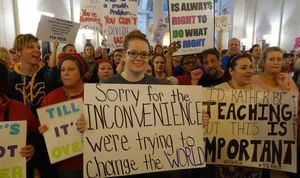North Carolina's gambling scene is poised for significant expansion as advocates push for the establishment of three new casinos. This development follows the state's previous leap from the lottery's establishment in 2005 to online sports betting becoming legal earlier this year.
The recent surge of interest lies heavily on the lobbying efforts and financial contributions from the gambling industry, which have stirred considerable debate among legislators and citizens alike. Proponents argue the potential revenue from casinos could fill state coffers and keep North Carolinians’ gambling dollars local. Critics, on the other hand, point to the risks of addiction and the economic targeting of lower-income communities.
“The elephant symbolizes gambling, and the tent stands for the State of North Carolina,” said Tom Campbell, a veteran broadcaster and political commentator. “Gambling is being introduced to our state one step at a time.” Since the approval of the lottery, the state's gambling footprint has gradually increased, culminating with sports betting legalization this March.
According to the North Carolina State Lottery Commission, between March and the recent Super Bowl, residents wagered over $6 billion on sports, with the state collecting approximately $118 million from gambling taxes. Of this, $2 million was allocated to gambling addiction prevention programs, with additional funding directed toward various educational and athletic initiatives.
Legislative sessions historically see attempts to enable new casinos, and last year was no exception. A proposal for three additional gambling venues nearly passed but faced backlash from community groups and opposition from within the state House. House Speaker Tim Moore noted the overwhelming influence of lobbying efforts, remarking, “You can't swing a dead cat in this place [the legislative building] and not hit a lobbyist for gaming.”
Bob Hall, from the watchdog organization Democracy NC, highlighted the political donations flowing from the gambling industry, noting, “From January 2022 to March 2024, the gambling industry contributed $3 million, including $1.1 million directly to Republican lawmakers.” This heavy financial backing emphasizes the power of the gambling lobby.
Despite the setbacks, the prospect of a new casino is brightening, especially following President Trump's endorsement of the Lumbee tribe for federal recognition, potentially allowing them to open a casino on tribal land. This would add to the existing gaming venues at Cherokee, Murphy, and Kings Mountain. The strategic positioning of neighboring casinos, like Caesar's newly opened facility just across the Virginia border, adds pressure on lawmakers to approve new sites.
“Wouldn’t it be preferable if our state benefitted from the revenue generated by tourism and gambling taxes rather than giving it to out-of-state facilities?” proponents ask, echoing arguments used during earlier gambling expansions.
Yet, dissenting voices remind us of the potential pitfalls of increasing gambling opportunities. David Diamont, who served two decades as a state representative and has spent much of his career focused on education, voiced his frustrations on social media, stating, “What do you expect when governments encourage gambling?!... This is actually a tax shift to the middle and lower class.” His warning highlights the moral and financial dilemmas surrounding state-sponsored gambling initiatives.
With lawmakers set to gather again for upcoming sessions, the prospect for casino approval seems imminent. If history truly is prologue, it appears North Carolina is on the brink of full integration of casinos, likely paving the way for the establishment of additional gaming facilities, including horse and dog tracks.
The debate over gambling's expansion continues, balancing the lure of economic gain against social responsibility. Supporters believe the time has come for casinos to become more than just a distant hope, but whether the elephant will entirely fit under the tent remains to be seen.



